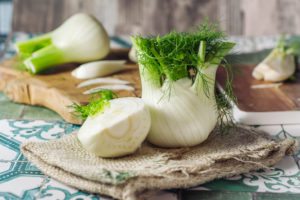By Kayla Michaud, RD, LDN
 Fennel originated in the Mediterranean region and plays an important role in Italian cuisine as well as other cuisines from around the world. It primarily grows in coastal climates and on riverbanks, with most of the fennel consumed in the U.S. grown in California. Interestingly, fennel can be found not only in a variety of culinary dishes but also in mouth fresheners, toothpaste, desserts, and antacids.
Fennel originated in the Mediterranean region and plays an important role in Italian cuisine as well as other cuisines from around the world. It primarily grows in coastal climates and on riverbanks, with most of the fennel consumed in the U.S. grown in California. Interestingly, fennel can be found not only in a variety of culinary dishes but also in mouth fresheners, toothpaste, desserts, and antacids.
Fennel is a bulb-like vegetable that is a part of the family that includes parsley, carrots, and celery. All parts of the fennel plant are edible—including the bulb, stalks, feathery fronds, and the seeds, which are treated as a dried spice. There are two varieties of fennel; one that is most commonly harvested for its seeds and fronds, and the other for its bulb and stalks. Both types of fennel have a licorice-like flavor. The fronds of the herb fennel are used mainly in fish dishes, soups, and teas, and the seeds are used as a spice in a variety of dishes. The fennel bulbs are often used in salads, stir fries, or as side dishes, and can be be eaten raw, roasted, grilled, sautéed, or steamed.
Fennel contains iron and histidine, an amino acid, both of which are useful in the prevention and treatment of anemia. Studies have shown that fennel is also beneficial for gastrointestinal function; fennel seeds can be eaten to help stimulate digestion while reducing inflammation in the stomach and intestines. You may have seen fennel seeds served after meals as a digestant and breath freshener in many Indian restaurants. Additionally, fennel is a good source of fiber which can help maintain healthy levels of cholesterol by stimulating the elimination of the LDL cholesterol. Fennel is also a rich source of potassium which acts as a vasodilator, meaning it relaxes the blood vessels and allows blood to move more fluidly, thus reducing blood pressure. These are just a few of the possible health benefits of fennel but studies have also shown that it may also improve brain function, boost immunity, and fight against cancer.
Fennel can serve as a great flavor enhancer with a wide variety of health benefits. There are many uses for this versatile vegetable—try some of the suggestions listed below.
- Thinly slice fresh fennel and add it to an apple and chicken salad.
- Add chopped fennel bulb to a soup to enjoy on a cold day.
- Roast the sliced bulb with olive oil and vinegar and serve as a side dish to any entrée.
- Pair the bulb and fronds with radishes, onions, and parsley to create a fennel slaw for your next barbecue.
- Slice thin and combine with your favorite pasta for a well-rounded dish.
- Add fennel seeds to your tea after a meal.
- Add fennel seeds and red pepper flakes to ground beef or turkey for an Italian sausage flavor.
If you'd like to incorporate fennel in your next meal, try out HHS Chef Craig Smith's recipe for Roasted Chicken Thighs with Fennel!


.png?width=1278&name=HHS-company%20logo-final%20(1).png)